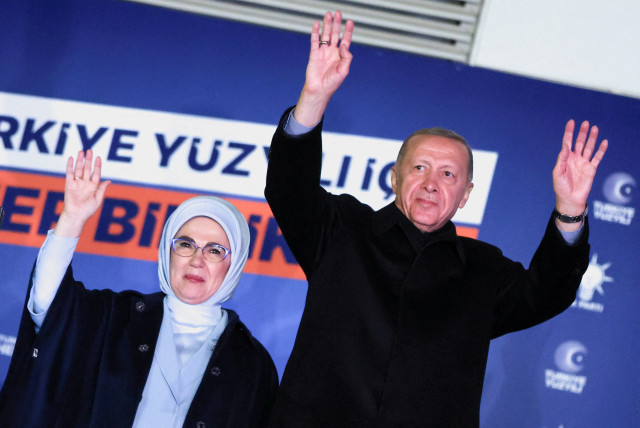Voices from the Arab press: Elections in Turkey and Arab attention

A weekly selection of opinions and analyses from the Arab media around the world.
Turkish elections: Why so much Arab attention?
An-Nahar, Lebanon, May 12
The latest issue of the prestigious British magazine The Economist conveys a clear message on its cover: “The most important elections in 2023,” which refers to the upcoming elections in Turkey. The magazine is firmly opposed to the rule of President Recep Tayyip Erdogan and the Islamic Justice and Development party he leads. The editorial in the issue is dedicated to this position and calls for the overthrow of Erdogan, who is classified as an Islamic autocrat allied with other autocrats, such as Russian President Vladimir Putin.
In the coming years, these elections will have repercussions not only for the region, but also for Europe and Asia. This position has been echoed by most European and American media outlets, some of which have gone as far as publicly slandering the Turkish president.
In the Arab world, the concern is palpable, as Turkey, the nation closest to them, approaches its election day. Turkey’s size and Erdogan’s two-decade rule under the Justice and Development party have made this election more consequential than any before it. Should the president and his party fall, the election will be a watershed moment for the region, potentially changing the course of one of the Middle East’s major powers.
The reverberations of such an event will be felt in Syria, Iraq, Lebanon, Libya, Egypt and beyond. As the polls opened in Turkey, the region was poised to witness a shift in power with the potential fall of President Erdogan. Analyses suggest that this could drastically alter Turkish foreign policy, particularly in its “vital sphere,” which includes Arab states.
Erdogan’s “neo-Ottoman project” has sought to expand Turkey’s influence in the region, and his potential fall could lead to a reshuffling of alliances. While some Arab countries may celebrate Erdogan’s fall, others may have to reevaluate their bet on the existing alliance.
Whatever the outcome, the region is set to experience major changes. The Turkish elections are garnering significant attention from the Arab political and media worlds, as they are the first elections President Erdogan has run without being guaranteed a victory beforehand.
Several scenarios may arise based on the outcome of the elections. If Erdogan wins the presidency but loses the parliamentary majority, his power will remain wide-reaching, albeit more difficult to wield than before. If he loses both the presidency and the parliament, his rule will be met with daily disruption from a parliament attempting to undo the constitution he put in place in 2017.
If Erdogan’s party wins the parliament but he loses the presidency, it will be a major setback, as his authority has been a major factor in the success of the Justice and Development party. It is likely that the elections will result in a delicate balance, with Erdogan in the presidency and a dispersed parliament between his party and the six-party alliance. This could result in minor shifts in Turkish foreign policy, with a decrease in Erdogan’s influence over any future coalition government. – Ali Hamada
Soft power by al-Azhar and the Church
Al-Masry Al-Youm, Egypt, May 13
At a time of great global upheaval, with economic and political crises, tensions in the seas and oceans, and discord among nations, reports have come out indicating that the UN Security Council has asked the grand imam of al-Azhar, Dr. Ahmed el-Tayeb, and the Vatican’s Pope Francis, to deliver a speech at their June session emphasizing the importance of values of human brotherhood in promoting and sustaining peace.
If news of the imam and pope coming together is confirmed, it would be yet another example of how the Egyptian al-Azhar institution, under the leadership of its esteemed sheikh, is a major contributor to Egypt’s soft power. As a country with a long-standing and dynamic civilization, Egypt’s citizens offer humanity a model of excellence in all aspects of life.
Al-Azhar, which has an influential presence in countries across the globe, is an essential force to be reckoned with. Its influence spans far beyond religious realms, extending to economic matters as well. I believe the tolerant nature of el-Tayeb of al-Azhar is a key factor in the institution’s strength in the international arena.
He consistently advocates for the tolerant principles of Islam and works to spread the values of tolerance through collaboration between people. He stresses that the verses of the Koran and the teachings of the Sunnah reject violence and hatred, in accordance with the Document on Human Fraternity signed by Pope Francis during his visit to the United Arab Emirates.
The Egyptian Church has also been active on this issue. Pope Tawadros II of Alexandria, patriarch of the See of St. Mark, recently held a meeting with Pope Francis during the visit of the Coptic Orthodox and Catholic Church delegations. The meeting celebrated the 50th anniversary of the historic meeting between Pope Paul VI and Pope Shenouda III.
The Egyptian Church and Pope Tawadros II have showcased the strength of the Christian religious institution to the world. Their successful meeting reaffirmed the cohesion of Egypt’s social fabric and its unity, which enhances its tolerant, civilized image. Such meetings possess a magical effect not only on religious individuals but on people across the globe.
It is a point of pride to belong to a country with both al-Azhar and the Eastern Church and to live among people who embody such levels of tolerance and love. – Abdel Latif El Menawy
Translated by Asaf Zilberfarb.
Jerusalem Post Store
`; document.getElementById("linkPremium").innerHTML = cont; var divWithLink = document.getElementById("premium-link"); if (divWithLink !== null && divWithLink !== 'undefined') { divWithLink.style.border = "solid 1px #cb0f3e"; divWithLink.style.textAlign = "center"; divWithLink.style.marginBottom = "15px"; divWithLink.style.marginTop = "15px"; divWithLink.style.width = "100%"; divWithLink.style.backgroundColor = "#122952"; divWithLink.style.color = "#ffffff"; divWithLink.style.lineHeight = "1.5"; } } (function (v, i) { });

